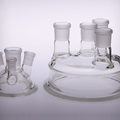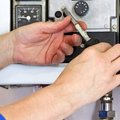Car Care Tips To Help You Get Repairs Done Right.
Car Care Tips To Help You Get Repairs Done Right.
Everyone has to deal with auto repairs at some time in their life. Car repairs can cost a significant amount of money. Whether you are doing the repairs yourself or hiring a mechanic, it is a good idea to know what you are doing. Use these tips to be better prepared when you have to fix your car.
Pay attention to the gauges and trouble lights on your cars dash. Learn to recognize the warning signs of a car that is overheating, low on oil or not charging the battery. Knowing which of these indicators need immediate attention can prevent damage to your car and save you cash in the long run.
When hiring a mechanic to repair to automobile, always seek referrals and opinions from friends, family and colleagues you trust. Doing so will ensure that you can find someone who has provided reliable, quality service in the past and provided good value to customers. In this way, you can greatly improve the likelihood that your car will be in good hands, and you will ultimately be satisfied with the work done.
Just like at the doctor, you can get a second opinion before agreeing to costly repairs. A reputable shop should not be padding the bill, but it does not hurt to see what another professional thinks about the situation. If you are still nervous, the dealer is always an option. It will be more expensive, but they tend to someone checking over their shoulder more often.
Keep your car's owner manual handy. Knowing vital car information can really help when something unexpected occurs. If you know your car's controls, you may even avoid a trip to a mechanic. If you do need a mechanic, you should have the make, model, and trim level available so that they can figure out things like your transmission configuration, size, etc. much quicker.
Make sure you get a signed copy of the estimate for the repairs. You also need to make sure that the contract contains a clause that the shop must contact you before exceeding the total on the estimate. This will protect you from getting a surprise bill once work is completed.
In addition to basic tire changing equipment, keep a plastic tote filled with DIY auto repair supplies in the trunk of your car in case of emergencies. Fill it with at least a quart each of motor oil, transmission fluid, steering fluid, and brake fluid and a gallon of water. Add a can of penetrating oil spray, a roll of duct tape, twine, bungee cords and basic tools so that you can manage minor repairs on the road.
If you need to get your car fixed after an accident, you should contact your insurance to get a list of approved mechanics. Going to an approved mechanic means your insurance will cover some of your expenses. Besides, you are more likely to find a good certified mechanic if you go to a professional chosen by your insurance company.
Remove valuable things from your car prior to taking it in to get fixed. Mechanics may need to take these items out to do the work and they aren't responsible if you discover something missing. Take everything out of the trunk as well.
Invest in a spare tire and a jack, and keep them in your vehicle. Most vehicles come with them, but you want to check anyway. You will have to spend a lot to get your car towed if you cannot change the tire right away. You can save money and have an easier time doing it on your own.
If you take your car to an auto repair shop to get one thing fixed and they tell you that other repairs are needed, thank them for the information and decline the additional services. Go to several other places and get quotes before allowing them to do any more work on your car.
Be sure to verify that the shop that you is properly licensed. If they are not, there is probably a reason for it, which could range from fraud to faulty repairs. Never use a shop that does not hold all of the licenses that they should in order to operate as a business.
If your car overheats on the highway, move to the side and turn off your engine as soon as you can. Don't try checking on any liquids as they can burn you if you aren't sure what you are doing. Rather, call a tow truck immediately to get you to your auto repair shop.
Request that the shop doing your auto repairs only use original equipment manufacturer, or O.E.M., parts. The additional cost compared to generic components is worth the investment in the long run. You can expect optimal performance and increased vehicle longevity when you choose parts specifically made for your car rather than generic.
Sometimes parts of your car will need to be replaced. In the event of this, tell your repair shop to use OEM parts rather than generic parts. OEM stands for Original Equipment Manufacturer. The OEM parts will give your car the best performance possible, while the cheaper generic parts may leave your car running less efficiently and increase the risk of problems in the future.
An auto-log is a great tool for monitoring your vehicles response over a period of time. Every time you stop to fill up the tank, record your mileage and the amount of gas. If you notice your mileage begins to worsen over time, then mention it to your service repairman.
If you start to experience trouble on the road when you are far from home, always check for recommendations and reviews of mechanics in the vicinity before just turning over your keys to the first garage you come upon. Remember that these people will know you are in a precarious position and may try to take advantage of you.
One of the best ways to save money is by being informed about car maintenance and repairs. Some mechanics take advantage of those with little car knowledge. Use the advice you learned here to either do the repairs yourself or be better armed against shady mechanics. You can save thousands over a lifetime.



